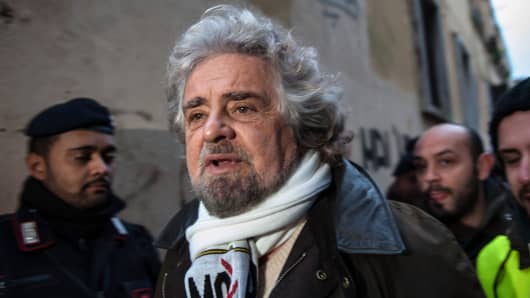The rise of the protest vote and support for non-mainstream parties in Italy could lead to a surprise in the national election on Sunday,taking key votes away from established candidates in what looks set to be a close race.
As financial scandals hit the banking and business world in Italy and alleged corruption and collusion between politicians and business leaders is exposed, so-called "fringe" parties such as comedian Beppe Grillo's "5 Star Movement" (M5S) have found themselves unexpectedly becoming mainstream contenders in the Italian elections on February 24/25.
The Italian public appears to be looking for a change to the old guard, with many opting for fringe parties to express their discontent with established politicians.
Polls published before an official blackout begun on February 9 show that center-left leader Pier Luigi Bersani and his Democratic Party (PD) are ahead in the polls, with a 5.7 percentage point lead over Berlusconi's revamped coalition party, "Popolo della Liberta" (PDL) party. Grillo's movement,seen by many as a protest vote, is in third place ahead of technocrat leader Mario Monti's bloc.
(Read More: Is Berlusconi Getting a Bounce From Tax Evaders?)
With 25 percent of Italians still undecided on who to vote for, the former lawyer and comic Grillo could see his share of the vote increase dramatically in the last week of campaigning as a disaffected Italian public tires of technocrat prime minister Mario Monti's austerity measures, former premier Berlusconi's peccadillos and Bersani's pro-European stance, unpopular among Italians.
Daniele Antonucci, senior economist at Morgan Stanley,said that the risk of a hung parliament, where no one party has a majority of the seats, had increased with the rise of alternative political players. Left-wing and protest parties made strong gains in regional elections last May.
(Read More: Italy Elections Could Derail Economy)
"A development that might increase risks of an excessively fragmented parliament is the rise of 'fringe' parties such as the far-left Five Star Movement," he said in a note on Monday.
"With about 15 percent of the vote, this appears to be Italy's third-largest party, even ahead of those supporting Mr. Monti...What's more, it seems that over 25 percent of Italians are still undecided or will not vote. That's a big swing factor, and could determine the outcome of the election – should a large portion of these voters come to the polls," he added.
Oscar Giannino, leader of protest party "Fare Per Fermare Il Declino" (Act to Stop the Decline) which could form an alliance with Grillo's movement (Grillo has dismissed the possibility of forming a coalition government with mainstream parties) told CNBC on Monday that Italy needed fresh political ideas and personalities.
"We have common ground with the five star movement on their transparency proposals,on measures to cut the cost of politics in this country. When I talk about transparency I mean audits of the monthly earnings of elected officials, to cut MPs' salaries,broadcast on the web the meetings of the council of ministers."





